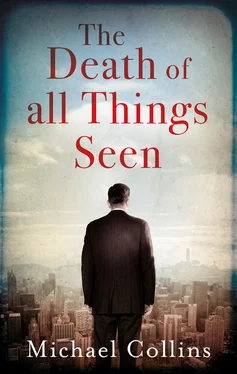Einhorn flew to Charles de Gaulle six weeks after it was discovered Rachel was no longer at school. The call came not from the school, but from the boyfriend’s father, who called Saul, who immediately challenged Einhorn. The boyfriend was upset. He had accompanied Rachel to France to protect her, and beneath the revelation, Einhorn swelled with a secret pride that Rachel had done what she had set out to do and had found true love.
An investigation turned up a phone number that led to a series of calls. It was not exactly as Einhorn imagined. Rachel was hesitant. She thought he should come see her. There was concern in her voice. Her mother wasn’t to know. It was agreed she and Philippe would meet Einhorn off the train at Saint-Malo.
It drove a wedge between Saul and Einhorn. Saul contended that the French had let the Germans march right into Paris. He held the country in the greatest disdain possible. He hated, equally, existentialism and a faithless disregard for God. It was almost too much to stomach for Einhorn, what they were doing between them, the lives under ruin, and to talk in these terms, to deliver such a sanctimonious assessment of a culture and a people.
Einhorn took the precaution of securing a driver off the flight from Charles de Gaulle. He had the driver drop him at a station before Saint-Malo, so it seemed the most natural of arrivals, when he had the basics of the escape plan established. The driver would await instruction. He worked with embassy attachés and was professionally accustomed to quick getaways and absolute secrecy. His rate was $1,700 a day.
Philippe was everything Einhorn expected, his hair pulled back in a ponytail. His face had an equine quality of strong peasant breeding. There was no awareness of what would happen in the coming days, or why Einhorn was there. Philippe was pleasing and hospitable and believed in his heart that Rachel loved him. He called Einhorn, Mon Pere .
It would have been easier if Philippe’s motivations were less obvious, but Philippe embraced Einhorn in the way the peasant French greeted, slapping Einhorn hard on the back, kissing him on both sides of the cheek. He was like a great statue, say Michelangelo’s David, who had stepped down from a pedestal and set about life in the ordinary world. Einhorn felt in his loins the flicker of what his daughter must have felt, and he had the most disconcerting thought, that if he could swap out his life for this life, to be in the company of Philippe Rotheneuf, he would have done so.
They drove in an old Renault borrowed from a neighbor, Philippe scattering sheep with the horn. He used his fist like an anvil. The car could not accommodate his size. He negotiated a series of blind turns run along hedges that made the road dark and patchy with a black ice. He talked in his broken English, his head touching the roof of the car.
The seaside village appeared around a bend, sudden and complete, the fierceness of the Atlantic pulling smoke from chimneys against a sky hung on a shroud of grey mist. The smell was so insistently strong. It was in their nostrils, the charred wood, the coal and the salt, all of it mixed and defining a life by the sea. Further on, a crescent of beach was garlanded in a tidal swell of shifting seaweed.
The proposed location of the culinary school was halfway down a steep decline to a horseshoe pier that boiled in a chop of waves breaking over an ancient stone, while black-clad fishermen looked up momentarily, stitching and repairing nets in a fingering spool of filament like earnest spiders.
At the establishment, the one in question, for it was hard distinguishing it really, since the houses were all part of a long grey façade running toward the pier, they saw it, or saw chairs upended on a table. It was desolate, empty and cold. A laced curtain hung like a veil. Rain fell out of a grey sky.
They looked at it a second time. They might see it tomorrow. It was Sunday. It wasn’t going anywhere. The owner, a devoted Catholic, observed the Sabbath, Einhorn, aware how a marrow cold morning might pass in medieval devotionals while a roast cooked in a sizzling fat and how, afterward, against a pull of windblown storm, an afternoon might be given to a roaring fire and a read of papers with a well-deserved plug of tobacco.
They passed the house going down the hill a third time. Philippe pointed through the streaking rain, the throated gurgle of gutters spluttering in a glazed runoff, whitewashed walls stained a sanguine iron-rust. Philippe spoke of a recipe that he had learned from his grandmother for mussels cooked in a white wine, served with a goat cheese garlic crouton. He would prepare it later.
Einhorn listened in a quiet betrayal, inventorying Philippe, infatuated by the immensity of his knowledge, Philippe’s muscular hand on Einhorn’s thigh in a familial familiarity of peasant closeness. It was evident, Philippe believed in the singularity of fate and could see no other reason Einhorn was here other than to sanction this union. He wore a cravat around a muscular, veined neck and emanated a hot ripeness of stale sweat in a layering of shirts with worn collars.
In the rear-view mirror, Einhorn averted his eyes from Philippe. He caught sight of Rachel, her mouth curved in the vague expression of resignation. She was already pregnant and fearful and wanted to be home again. She had bouts of morning sickness and looked grey as the landscape.
Philippe wanted Einhorn to see something. Rachel should stay. Philippe kissed her hand with a subtle intimacy that only the French could affect, the bud of his lips on the back of her hand. They proceeded down along a ragged coastal road against the pull of wind. The bay churned in a pewter swell. Against Philippe’s advancing strides, Einhorn tried to keep up. He had to eventually trot, until they arrived at a series of caves where Philippe explained how, during the Neolithic age, man first committed his history in the simple story of the hunt. It brought Einhorn close to tears. This was everything he ever wanted, this life, this apparent freedom, this man.
*
It took three days before Einhorn could execute the escape. The professional driver, who had seen his share of intrigue and who had spent the three days a town over, syphoned the gas from the Renault, so it was a great consternation and uproar as a towering Philippe appeared in his nightshirt, like a mythic Cyclops, raging against the night.
They flew home Business Class. They stayed at a suite at The Plaza, looking out on Central Park. The next afternoon, Rachel emerged from a clinic on New York’s Upper West Side. She was pale and disoriented, but on the other side of a great mistake. She held her father’s arm. He hailed a cab, and they were gone toward the bustle of mid-town, while the Rotheneuf legacy, what was left of it, the bits and pieces, the flesh and blood, made its way along East 91st Street, toward the funneling sewers along the East Side River, rounding the Statue of Liberty before being carried out to sea.
Rachel was a better mother for it, years later, when her mind was more determined. She married a doctor with the conscious understanding of what she was doing. Einhorn took her hand and gave her away in an extravagant affair that he paid for because this was how a daughter in some circles was still passed on, in the last shouldering of expense before she became the property and charge of some other man. She would never work a day in her life. It was a great accomplishment, not to have to want for anything of a material nature.
A check Einhorn had left for Philippe was eventually returned, along with the box of woolens Rachel had left behind, in what was the thoughtful evacuation of an American dream and an American girl. Philippe wrote a note in broken English that was heartbreaking. Einhorn read it and tore it up. Some things could never be explained, not by the deceiver, and not by the deceived.
Читать дальше












